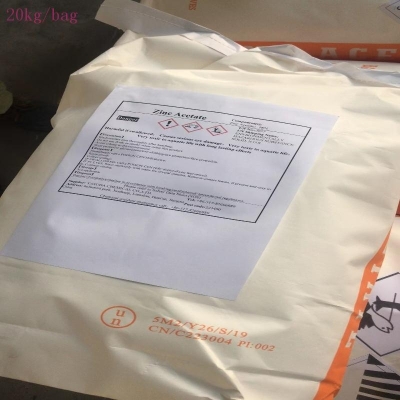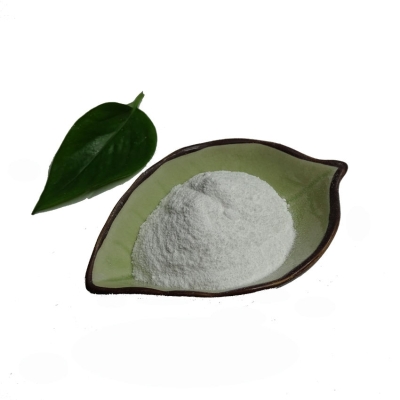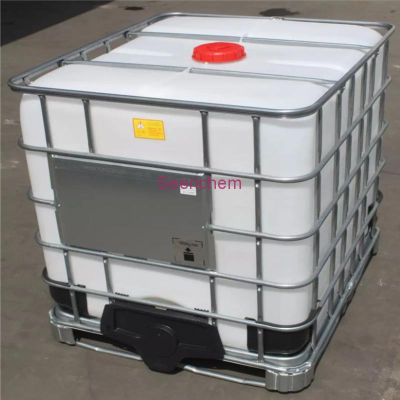-
Categories
-
Pharmaceutical Intermediates
-
Active Pharmaceutical Ingredients
-
Food Additives
- Industrial Coatings
- Agrochemicals
- Dyes and Pigments
- Surfactant
- Flavors and Fragrances
- Chemical Reagents
- Catalyst and Auxiliary
- Natural Products
- Inorganic Chemistry
-
Organic Chemistry
-
Biochemical Engineering
- Analytical Chemistry
-
Cosmetic Ingredient
- Water Treatment Chemical
-
Pharmaceutical Intermediates
Promotion
ECHEMI Mall
Wholesale
Weekly Price
Exhibition
News
-
Trade Service
This year, the traditional fertilizer market is almost full of green, and under the severe pressure of soil remediation, the organic fertilizer industry is expected to reverse the tepid situation and achieve an industrial counterattack.
At the organic-inorganic fertilizer industry matchmaking conference held in Qinhuangdao, Hebei on August 27, the participants believed that a new pattern of integrated development of chemical fertilizers and organic fertilizers is coming.
According to expert analysis, referring to the proportion of organic fertilizer used in developed agricultural countries, the annual market size of organic fertilizer in China will reach 360 billion yuan in the future.
(Organic-inorganic fertilizer industry matchmaking scene) Compared with the country's successive cancellation of preferential treatment and implementation of zero-growth actions for the chemical fertilizer industry in recent years, the benefits of the organic fertilizer industry have followed one after another.
Fu Chunhua, chairman of the Organic Fertilizer Branch of the China Agricultural Materials Circulation Association, said that countries around the world are paying more and more attention to soil protection.
The Chinese government has proposed cultivating high-standard farmland, improving the quality of cultivated land, zero growth in the use of chemical fertilizers in 2020, and exemption of value-added tax on organic fertilizers, etc.
Soil protection measures, especially the State Council’s "Soil Pollution Prevention and Control Action Plan" in May 2016, a series of policies have provided strong support for the promotion of organic fertilizers and also pointed out the direction for the transformation of traditional fertilizer companies.
"The organic fertilizer industry must be turned into the main force in soil restoration and the quality and safety of agricultural products, and a new pattern of coordinated development of organic and inorganic fertilizers must be established.
" Fu Chunhua said.
In the first half of the year, the fertilizer production and circulation industry suffered substantial losses.
Except for a very small number of listed companies that achieved profits, the profits of companies mainly based on elemental fertilizers fell sharply, and the sales income of the agricultural materials circulation industry fell by as much as 50%.
Experts believe that this dilemma is not caused by a single overcapacity.
From the perspective of supply-side reforms, the root cause lies in the fact that the fertilizer industry must truly provide products that farmers need.
For example, organic fertilizer products represented by biological fertilizers and biological organic fertilizers contain a lot of Large market space.
(Certificate issued by an expert from Fu Chunhua, Chairman of the Organic Fertilizer Branch of China Agricultural Materials Circulation Association) According to the data provided by the Organic Fertilizer Branch of the China Agricultural Materials Circulation Association, there are currently about 2,283 organic fertilizer companies in the country with a total production capacity of 34.
83 million tons.
Figures show that the use of organic fertilizers in China has declined rapidly since the 1980s, and now only accounts for about 20% of the total fertilizer use.
According to a report by Professor Li Ji of China Agricultural University, the proportion of organic fertilizers used in developed countries in the world is generally more than 50%, 55% in Australia, 57% in the UK, 60% in Germany, and 65% in Canada, which is less than that in China.
In Japan, where there are many people with similar national conditions, the use of organic fertilizer is as high as 76%.
"According to the standards of developed agricultural countries, if chemical fertilizers and organic fertilizers share half of the world, it means that we will produce 600 million tons of organic fertilizers each year, and the market size will reach 360 billion yuan.
" Li Ji inferred.
Expanding the organic fertilizer industry can not only save various non-renewable resources required for fertilizer production, but also ensure food security under the background of diminishing effects of fertilizer production.
It is understood that crop yields are directly related to soil organic matter.
In Europe, if the soil organic carbon is lower than 2%, the government will consider stabilizing or increasing the soil organic matter content.
At present, most of the cultivated land organic matter in China is only about 1%.
"When the soil has to be saved, and when the quality of agricultural products has to be improved, many organic fertilizers are both fertilizers and soil conditioners, and some are biostimulants, which are of great significance to agriculture.
" National Fertilizer Quality and Supervision and Inspection Said Shang Zhaocong, Deputy Director of the Center (Shanghai).
(Industry representatives read out the proposal for soil maintenance) Like the path that developed countries have taken, not only China, but many emerging agricultural countries have also realized the importance of protecting the ecological environment of cultivated land and have launched efforts in this regard.
Sheng Sheng, Deputy Minister of the Ministry of Agricultural Development of Laos, introduced that the Lao government attaches great importance to and advocates farmers to use organic fertilizers.
The Lao Ministry of Agriculture highly affirms the important role of organic fertilizers in environmental protection and hopes to increase the market share of organic fertilizers in a short time.
Chinese fertilizer companies are welcome to invest and build factories in Laos to jointly develop and protect the cultivated land resources and ecological environment in Laos.
??? (Speech by Sheng Sheng, Deputy Minister of the Ministry of Agricultural Development of Laos) Although the organic fertilizer industry is facing a major opportunity for counterattacks, there are still many shortcomings.
The most prominent manifestations are the small scale of production, the unstable source of raw materials, and the uneven product quality, including the problems of antibiotics and heavy metal pollution.
Overcome etc.
Fu Chunhua suggested speeding up the formulation of standards for all aspects of organic fertilizer raw materials, production and use, so that organic fertilizer can occupy the forefront of the era of soil repair and food safety.
As an important measure to realize the integration of the organic-inorganic fertilizer industry, this meeting issued a declaration on soil maintenance, and established an organic fertilizer technical committee composed of experts from China Agricultural University, Chinese Academy of Agricultural Sciences, Zhengzhou University and other experts.
Seventeen “soil repair ambassadors” were selected from industry representatives such as Feng Ecological, Zhongnong Holdings, Hebei Meihua, and Hubei Zhongnong Woyu, to actively work with the whole society to perform the mission of repairing soil and improving the quality of agricultural products.
The conference was co-sponsored by China Agricultural Production Material Circulation Association, China-ASEAN Agricultural Materials Chamber of Commerce, and Soil Environmental Remediation Engineering Technology Center of Shanghai Research Institute of Chemical Industry, co-organized by Guangdong Ruifeng Ecological Environment Technology Co.
, Ltd.
, Ministry of Agriculture, China National Supply and Marketing Cooperative , National Standards Committee, Chinese Academy of Agricultural Sciences, China Agricultural University, industry experts, production companies, circulation companies, foreign-funded companies, as well as Laos, Thailand and other Southeast Asian governments, scientific research institutes and more than 100 representatives from the business community participated meeting.
At the organic-inorganic fertilizer industry matchmaking conference held in Qinhuangdao, Hebei on August 27, the participants believed that a new pattern of integrated development of chemical fertilizers and organic fertilizers is coming.
According to expert analysis, referring to the proportion of organic fertilizer used in developed agricultural countries, the annual market size of organic fertilizer in China will reach 360 billion yuan in the future.
(Organic-inorganic fertilizer industry matchmaking scene) Compared with the country's successive cancellation of preferential treatment and implementation of zero-growth actions for the chemical fertilizer industry in recent years, the benefits of the organic fertilizer industry have followed one after another.
Fu Chunhua, chairman of the Organic Fertilizer Branch of the China Agricultural Materials Circulation Association, said that countries around the world are paying more and more attention to soil protection.
The Chinese government has proposed cultivating high-standard farmland, improving the quality of cultivated land, zero growth in the use of chemical fertilizers in 2020, and exemption of value-added tax on organic fertilizers, etc.
Soil protection measures, especially the State Council’s "Soil Pollution Prevention and Control Action Plan" in May 2016, a series of policies have provided strong support for the promotion of organic fertilizers and also pointed out the direction for the transformation of traditional fertilizer companies.
"The organic fertilizer industry must be turned into the main force in soil restoration and the quality and safety of agricultural products, and a new pattern of coordinated development of organic and inorganic fertilizers must be established.
" Fu Chunhua said.
In the first half of the year, the fertilizer production and circulation industry suffered substantial losses.
Except for a very small number of listed companies that achieved profits, the profits of companies mainly based on elemental fertilizers fell sharply, and the sales income of the agricultural materials circulation industry fell by as much as 50%.
Experts believe that this dilemma is not caused by a single overcapacity.
From the perspective of supply-side reforms, the root cause lies in the fact that the fertilizer industry must truly provide products that farmers need.
For example, organic fertilizer products represented by biological fertilizers and biological organic fertilizers contain a lot of Large market space.
(Certificate issued by an expert from Fu Chunhua, Chairman of the Organic Fertilizer Branch of China Agricultural Materials Circulation Association) According to the data provided by the Organic Fertilizer Branch of the China Agricultural Materials Circulation Association, there are currently about 2,283 organic fertilizer companies in the country with a total production capacity of 34.
83 million tons.
Figures show that the use of organic fertilizers in China has declined rapidly since the 1980s, and now only accounts for about 20% of the total fertilizer use.
According to a report by Professor Li Ji of China Agricultural University, the proportion of organic fertilizers used in developed countries in the world is generally more than 50%, 55% in Australia, 57% in the UK, 60% in Germany, and 65% in Canada, which is less than that in China.
In Japan, where there are many people with similar national conditions, the use of organic fertilizer is as high as 76%.
"According to the standards of developed agricultural countries, if chemical fertilizers and organic fertilizers share half of the world, it means that we will produce 600 million tons of organic fertilizers each year, and the market size will reach 360 billion yuan.
" Li Ji inferred.
Expanding the organic fertilizer industry can not only save various non-renewable resources required for fertilizer production, but also ensure food security under the background of diminishing effects of fertilizer production.
It is understood that crop yields are directly related to soil organic matter.
In Europe, if the soil organic carbon is lower than 2%, the government will consider stabilizing or increasing the soil organic matter content.
At present, most of the cultivated land organic matter in China is only about 1%.
"When the soil has to be saved, and when the quality of agricultural products has to be improved, many organic fertilizers are both fertilizers and soil conditioners, and some are biostimulants, which are of great significance to agriculture.
" National Fertilizer Quality and Supervision and Inspection Said Shang Zhaocong, Deputy Director of the Center (Shanghai).
(Industry representatives read out the proposal for soil maintenance) Like the path that developed countries have taken, not only China, but many emerging agricultural countries have also realized the importance of protecting the ecological environment of cultivated land and have launched efforts in this regard.
Sheng Sheng, Deputy Minister of the Ministry of Agricultural Development of Laos, introduced that the Lao government attaches great importance to and advocates farmers to use organic fertilizers.
The Lao Ministry of Agriculture highly affirms the important role of organic fertilizers in environmental protection and hopes to increase the market share of organic fertilizers in a short time.
Chinese fertilizer companies are welcome to invest and build factories in Laos to jointly develop and protect the cultivated land resources and ecological environment in Laos.
??? (Speech by Sheng Sheng, Deputy Minister of the Ministry of Agricultural Development of Laos) Although the organic fertilizer industry is facing a major opportunity for counterattacks, there are still many shortcomings.
The most prominent manifestations are the small scale of production, the unstable source of raw materials, and the uneven product quality, including the problems of antibiotics and heavy metal pollution.
Overcome etc.
Fu Chunhua suggested speeding up the formulation of standards for all aspects of organic fertilizer raw materials, production and use, so that organic fertilizer can occupy the forefront of the era of soil repair and food safety.
As an important measure to realize the integration of the organic-inorganic fertilizer industry, this meeting issued a declaration on soil maintenance, and established an organic fertilizer technical committee composed of experts from China Agricultural University, Chinese Academy of Agricultural Sciences, Zhengzhou University and other experts.
Seventeen “soil repair ambassadors” were selected from industry representatives such as Feng Ecological, Zhongnong Holdings, Hebei Meihua, and Hubei Zhongnong Woyu, to actively work with the whole society to perform the mission of repairing soil and improving the quality of agricultural products.
The conference was co-sponsored by China Agricultural Production Material Circulation Association, China-ASEAN Agricultural Materials Chamber of Commerce, and Soil Environmental Remediation Engineering Technology Center of Shanghai Research Institute of Chemical Industry, co-organized by Guangdong Ruifeng Ecological Environment Technology Co.
, Ltd.
, Ministry of Agriculture, China National Supply and Marketing Cooperative , National Standards Committee, Chinese Academy of Agricultural Sciences, China Agricultural University, industry experts, production companies, circulation companies, foreign-funded companies, as well as Laos, Thailand and other Southeast Asian governments, scientific research institutes and more than 100 representatives from the business community participated meeting.







